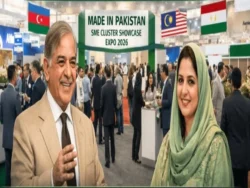A different Pakistan

On the 76th anniversary of Pakistan’s independence, much will be written about what has gone wrong with us and how we – and our fathers and grandfathers – have failed ourselves.
Countless keypad hours will be spent and innumerable sound-bites will be generated and consumed to whine and wail about how our regional and global competitors have left us behind and what kind of a doomsday scenario awaits us if we do not put our house in order immediately and urgently.
Could we avoid this annual grieving and mourning? Could we talk about what could be rather than what has been? To answer this question, we need hope and imagination more than relying upon experience and evidence. Given the many crises – social, economic, political, and cultural – that we have been facing for long, experience and evidence are bound to take us further down a path marked by the already familiar milestones of despair and despondency. The other road, though shrouded in the mists of uncertainty, is, thankfully, still paved with optimism, expectations and even brightness.
So, let us envision a Pakistan where no child remains out of school; where no one has to sleep on a hungry stomach; where no one belonging to a different faith has to hide his/her beliefs, identity, and rituals; and where women, transgender persons, and ethnic, linguistic and cultural minorities do not have to live under perpetual fear of dominance by an ever assertive majority. Let us imagine a country where people agree to disagree; where disagreements are not resolved through force; where differences of opinion do not generate unending violent conflicts; and where peace, prosperity, and plurality can exist without having to worry about the destructive winds of pride and prejudice.
Let us talk about a place where the future is not sacrificed on the altar of the present; where the wants of today do not ruin the needs of tomorrow; where the temples of modernity and development are not built on the ruins of nature; where production, consumption, and transportation remain means to achieve the end facilitating human life instead of becoming the sources of climatic disasters.
Imagine for a moment a Pakistan that the rest of the world is not uncertain and insecure about. Let us think of a place that contributes positively to the human civilization’s march towards mutual trust, acceptance and co-existence. This place could – or at least should – be a fount of the globe’s shared aims and objectives where interests and pursuits do not have to compete; where opportunities for the few do not have to be created by generating adversities for the many; and where a common destiny is pursued with a common passion and a common struggle.
The wish-list given above is certainly long and it is also light years away from the bleakness surrounding us. So, sceptics and pessimists might dismiss it as an idealistic fantasy. Yet, that is exactly the stuff that dreams are made of. Usually, we not only forget those ideas after we wake up but we often realize during waking hours as to how impossible it is to realize those dreams. Until, that is, some of those dreams indeed become true.
And we have seen that happen – not once, not twice but many times over. The coming into being of Pakistan as an independent state, the miracle called people’s will to choose their own representatives, individual sagas of success and collective efforts to maintain and sustain a cultural heritage that belongs to all of us and not just to the adherents of this faith or that ethnicity. All these things have happened while all else was shrouded in doom and gloom. Some of these things are happening even now when doom and gloom have taken us over.
This persisting doom and gloom is, in fact, colouring all our self-imagination. Consequently, our self-image is distorting and our dreams have become both divided and divisive. Since I see my differences from others more than I see my similarities with them, so I also start seeing my dreams through the lens of the same divisive categories. And then I start discrediting the dreams of all those who dare to be different from me or who remain different from me no matter how hard they try to appear like me. Such dreams are the stuff that discords, contentions and conflicts are made of. And such dreams are the stuff that is darkening our future.
Getting rid of our broken self-image and making our ideals and dreams inclusive is admittedly an arduous and mammoth task but is also something that can only be achieved if millions of small steps are taken simultaneously by millions of individuals.
A great starting point would be to initiate and cultivate a culture of dialogue, cooperation, coexistence and collaboration. The other major initial – and necessary – step would be to develop a critical engagement with our surroundings. An engagement that connects and also allows criticism. The third step in this direction would be a shared social and economic agenda that all segments of society not just own but also work diligently to achieve.
Such an agenda will help us rekindle the politics of hope, transcending the politics of mistrust and protest towards a politics centred on transformation and constructive proposals. A new covenant with Pakistan’s destiny beckons – a pledge to create a brighter future.
The writer heads the Sustainable Development Policy Institute. He tweets @abidsuleri





